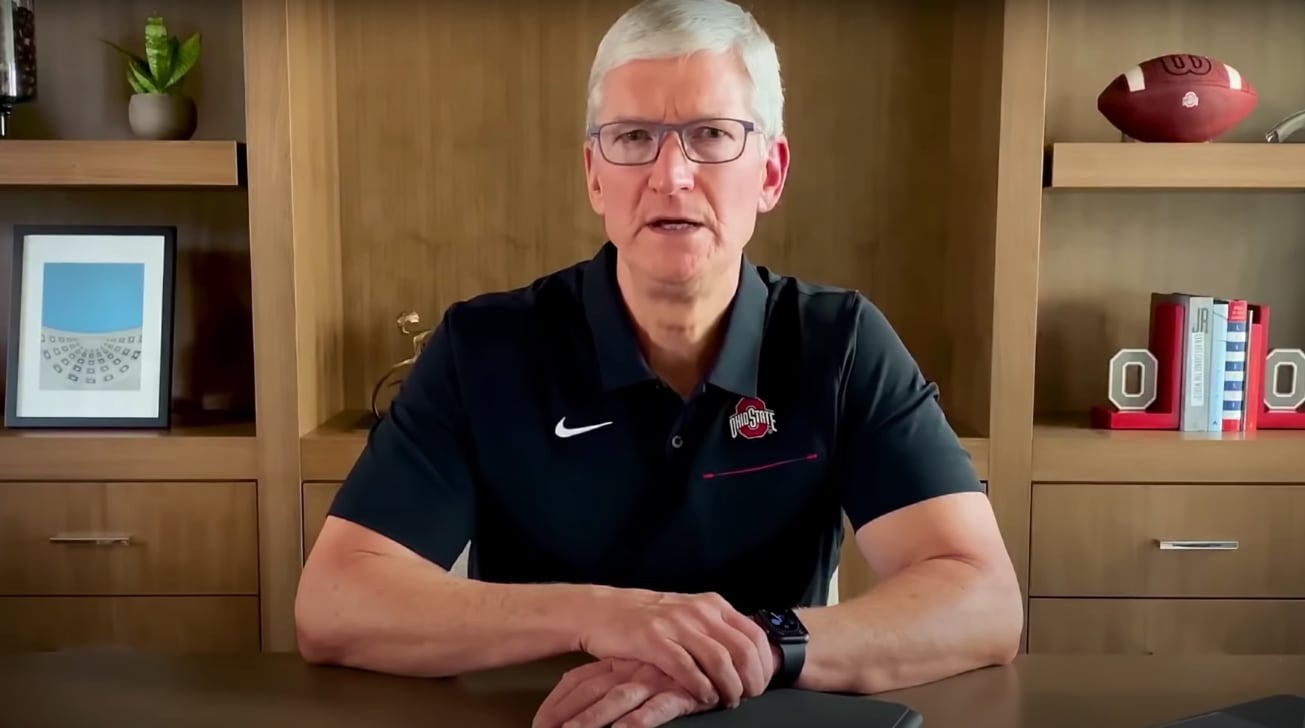Apple CEO Tim Cook has delivered a "virtual commencement address" to graduating Ohio State University students, with the video address offering life advice to viewers, as well as urging graduates to build a "better future than the one you thought was certain."
Released on Sunday via YouTube, Tim Cook's Ohio State University commencement address shows the Apple CEO sat at home, wearing a shirt bearing the Ohio State logo and an Apple Watch, rather than the usual gown attire of graduation ceremonies. The virtual commencement is an alternative to the typical in-person speeches delivered by Cook, necessitated by the continuing COVID-19 crisis and announced one month ago.
In the 7 minute 55 second video, Cook starts his speech by referring to the Spanish Flu, and the fortunes of Franklin D. Roosevelt, T.S. Eliot, and Amelia Earhart after recovering from their infections.
"Graduates, I am sorry that we're not celebrating together today. Your class is a special one — marked by history like few others in OSU's 150 years," Cook offers. "It can be difficult to see the whole picture when you're still inside the frame, but I hope you wear these uncommon circumstances as a badge of honor."
"Those who meet times of historical challenge with their eyes and hearts open — forever restless and forever striving — are also those who leave the greatest impact on the lives of others," he continued, before suggesting people have a choice "when our glittering plans are scrambled." Either people can "curse the loss of something that was never going to be," or they can "see reasons to be grateful for the yank on the scruff of the neck, in having our eyes lifted up from the story we were writing for ourselves and turned instead to a remade world."
Cook refers to his joining of Apple in 1998, expressing his luck at getting to "spend the rest of my professional life working for Steve Jobs," a period caught short by Jobs' death. "The loneliness I felt when we lost Steve was proof that there is noting more eternal, or more powerful, than the impact we have on others."
Abraham Lincoln is also referenced, a person Cook has found time to read while staying at home, recommending books about the former president "to anyone who wants to put these times into perspective."
As for the graduates, Cook tells them "your case is new. For you, the old dogmas have never been an option. You don't have the luxury of being enthralled. You enter a world of difficulty with open eyes, tasked with writing a story that is not necessarily of your choosing but is still entirely yours."
Cook signs off by urging the Class of 2020 to "Think anew. Act anew. Build a better future than the one you thought was certain. And, in a fearful time, call us once again to hope."
 Malcolm Owen
Malcolm Owen







-m.jpg)






 Charles Martin
Charles Martin
 Christine McKee
Christine McKee
 Wesley Hilliard
Wesley Hilliard

 Andrew Orr
Andrew Orr
 William Gallagher
William Gallagher
 Sponsored Content
Sponsored Content








4 Comments
exactly: https://planetofthehumans.com/
Tim is a worthy successor to SJ. He’s a remarkable, impressive human being.
I didn’t watch Cook’s speech but I’m sure it was very good. However, I sort of cringe at Appleinsider saying he mentioned the Spanish flu...I hope Cook didn’t try to draw any meaningful comparison. The Spanish flu killed as much as 10-20% of the population (because of the second wave which was far more deadly), as where preliminary antibody testing for the coronavirus is showing mortality less than 1%, many of which have underlying conditions which compromise their health. Not to mention that in not too much time we’ll have vaccines and already have treatment drugs approved.
The known facts so far (dismissing the panicky ‘projections’) show we’re not experiencing anything even close to the Spanish flu with Covid19.